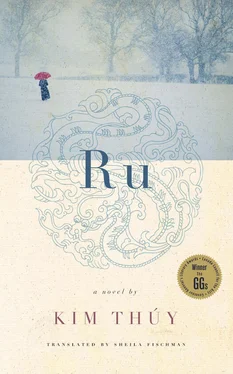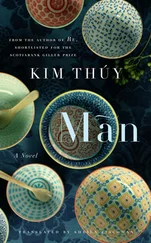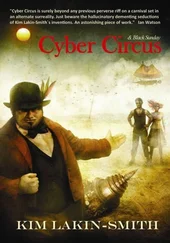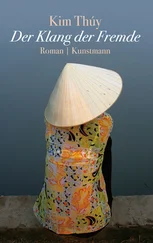We didn’t know where we were. We had landed on the first terra firma. As we were making our way to the beach, an Asian man in light blue boxer shorts came running towards our boat. He told us in Vietnamese to disembark and destroy the boat. Was he Vietnamese? Were we back at our starting point after four days at sea? I don’t think anyone asked, because we all jumped into the water as if we were an army being deployed. The man disappeared into this chaos, for good. I don’t know why I’ve held on to such a clear image of that man running in the water, arms waving, fist punching the air with an urgent cry that the wind didn’t carry to me. I remember that image with as much precision and clarity as the one of Bo Derek running out of the water in her flesh-coloured bathing suit. Yet I saw that man only once, for a fraction of a second, unlike the poster of Bo Derek, which I would come upon every day for months.
Everyone on deck saw him. But no one dared confirm it with certainty. He may have been one of the dead who had seen the local authorities drive the boats back to the sea. Or a ghost whose duty it was to save us, so he could gain his own access to paradise. He may have been a schizophrenic Malaysian. Or maybe a tourist from a Club Med who wanted to break the monotony of his vacation.
Most likely he was a tourist, because we landed on a beach that was protected because of its turtle population, and it was close to the site of a Club Med. In fact, this beach had once been part of a Club Med, because their beachside bar still existed. We slept there every day against the backdrop of the bar’s wall, which was inscribed with the names of Vietnamese people who’d stopped by, who had survived like us. If we’d waited fifteen minutes longer before berthing, our feet wouldn’t have been wedged in the fine golden sand of this heavenly beach. Our boat was completely destroyed by the waves created by an ordinary rain that fell immediately after we disembarked. More than two hundred of us watched in silence, eyes misty from rain and astonishment. The wooden planks skipped one at a time on the crest of the waves, like a synchronized swimming routine. I’m positive that for one brief moment the sight made believers of us all. Except one man. He’d retraced his steps to fetch the gold taels he’d hidden in the boat’s fuel tank. He never came back. Perhaps the taels made him sink, perhaps they were too heavy to carry. Or else the current swallowed him as punishment for looking back, or to remind us that we must never regret what we’ve left behind.
That memory definitely explains why I never leave a place with more than one suitcase. I take only books. Nothing else can become truly mine. I sleep just as well in a hotel room, a guest room or a stranger’s bed as in my own. In fact, I’m always glad to move; it gives me a chance to lighten my belongings, to leave objects behind so that my memory can become truly selective, can remember only images that stay luminous behind my closed eyelids. I prefer to remember the flutters in my stomach, my light-headedness, my upheavals, my hesitations, my lapses … I prefer them because I can shape them according to the colour of time, whereas an object remains inflexible, frozen, unwieldy.
I love men in the same way, without wanting them to be mine. That way, I am one among others, without a role to play, without existing. I don’t need their presence because I don’t miss those who are absent. They’re always replaced or replaceable. If they’re not, my feelings for them are. For that reason, I prefer married men, their hands dressed in gold rings. I like those hands on my body, on my breasts. I like them because, despite the mixture of odours, despite the dampness of their skin on mine, despite the occasional euphoria, those ring fingers with their histories keep me remote, aloof, in the shadows.
I forget the details of how I felt during these encounters. I do remember fleeting gestures, such as Guillaume’s finger brushing against my left baby toe to write his initial G; the drop of sweat from Mikhaïl’s chin falling onto my first lumbar vertebra; the cavity at the bottom of Simon’s breastbone, Simon who told me that if I murmured into the well of his pectus excavatum , my words would resonate all the way to his heart.
Over the years, I’ve collected a fluttering eyelash from one, a stray lock of hair from another, lessons from some, silences from several, an afternoon here, an idea there — to form just one lover, because I’ve neglected to memorize the face of each one. Together, these men taught me how to become a lover, how to be in love, how to long for an amorous state. It’s my children, though, who have taught me the verb to love , who have defined it. If I had known what it meant to love, I wouldn’t have had children, because once we love, we love forever, like Uncle Two’s wife, Step-aunt Two, who can’t stop loving her gambler son, the son who is burning up the family fortune like a pyromaniac.
When I was younger, I saw Step-aunt Two prostrate herself before Buddha, before Jesus, before her son, to plead with him not to go away for months at a time, not to come back from those months of absence escorted by men holding a knife to his throat. Before I became a mother, I couldn’t understand how she, a businesswoman with clenched fists, keen eyes, a sharp tongue, could believe all the lying tales and promises of her gambler son. During my recent visit to Saigon, she told me she must have been a serious criminal in her former life, if she was obliged, in this life, to constantly believe the deceptions of her son. She wanted to stop loving. She was tired of loving.
Because I had become a mother, I lied to her too by remaining silent about the night her son took my child’s hand and wrapped it around his adolescent penis, and about the night when he slipped inside the mosquito net of Aunt Seven, the one who is mentally retarded, defenceless. I shut my mouth to keep my aging, worn-out step-aunt Two from dying because she had loved so much.
Aunt Seven is my maternal grandmother’s sixth child. Her number, seven, didn’t bring the good luck it was supposed to. When I was a child, Aunt Seven sometimes waited for me at the door holding a wooden spatula, ready to hit me as hard as she could to drive out the heat that was stored in her body. She was always hot. She needed to cry out, to fling herself onto the floor, to let off steam by hitting. As soon as she started howling, all the servants ran through the house, leaving their bucket of water, their knife, their kettle, their dust cloth, their broom along the way, and came to hold her down. To this tumult were added the cries of my grandmother, my mother, my other aunts, their children and my own. We were a twenty-voice choir nearly hysterical, nearly mad. After a while we no longer knew why we were howling, because the original cry, Aunt Seven’s, had been muffled by our own noise for so long. But everyone went on crying, taking advantage of the opportunity to do so.
Sometimes, instead of waiting for me at the door, Aunt Seven would open it after stealing the keys from my grandmother. She would open it so she could leave us and end up at large in the alleyways, where her handicap wasn’t visible, or was at least ignored. Some ignored her handicap by accepting her twenty-four-carat-gold necklace in exchange for a piece of guava, or by having sex with her in exchange for a compliment. Some even hoped that she would become pregnant so they could make the baby the object of blackmail. At that time, my aunt and I were the same mental age, we were friends who told each other what scared us. We shared our stories. Today, my handicapped aunt thinks of me as an adult, so she doesn’t tell me about her escapes or her old stories from the alleyways.
I too dreamed of being outside, playing hopscotch with the neighbourhood children. I envied them through the wrought iron grilles over our windows or from our balconies. Our house was surrounded by cement walls two metres high with shards of broken glass embedded in them to discourage intruders. From where I stood, it was hard to say if the wall existed to protect us or to remove our access to life.
Читать дальше












